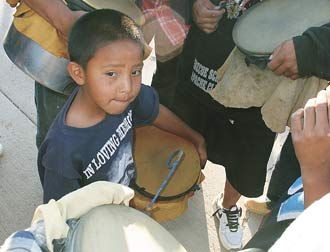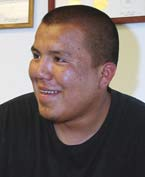|
|
| By: Jo Baeza, The Independent | 05/26/2006 |
|
|
Cibecue is a place of tradition. A place where children grow up speaking the Apache language. A "place where wisdom sits," as an Apache saying goes. But, in recent years that culture, language and tradition have been threatened. As it was in the legends, some of the people have been influenced by corrupt and evil powers. In 2006 evil can take the form of meth or cocaine, heroin or alcohol, child abuse, broken families and broken lives. In this world, it is not possible to insulate a community against evil from within or without. Lately, it has seemed as if the Gaan, the Mountain Spirits, abandoned the People, just as they had once before. Then something wonderful happened. They came back. To understand the importance of what is happening today, you must know a little of the legend of the Gaan. According to "The People Called Apache" by Thomas E. Mails, the Creator placed the Gaan, or Mountain Spirits, in the mountains to care for the land and all living things. Gradually, being human, the Apache people gave into corruption and crudeness and succumbed to evil powers. The Gaan were sent from their home to the People to teach them how to live in harmony - how to cure the sick, govern fairly, hunt, gather, plant, harvest, and how to punish those who failed to live the way the Creator intended.
A few men were determined to restore harmony by impersonating the Gaan, going by the sacred pictures they found. They copied the masks, headdresses, skirts and moccasins and used them to perform dances and say prayers that had power to change people's hearts. Those dances are still being performed. When some of the children in Cibecue began to stray from tradition and get into trouble, wise counselors helped them form dance groups. If the Gaan saved the Apache people in the past, they could save them today. Hedy Kelewood, director of educational support services at Cibecue School, began to build up the Apache Club. The Apache Club now has approximately 30 members in elementary school, 18 in middle school, and 22 in high school. One of the students whose life was changed by his membership in the Apache Club was Joseph Tessay. He admits that he was headed in the wrong direction for a while. He dropped out of school last July and has had some setbacks, but is now working on his GED and is dancing. He said, "They tell me to be respectful and learn things about my tradition and keep up my prayers. The reason I stick with it is to keep up my grandpa's traditions. He was teaching me the way of the warrior before he died. He taught me to pray. He took me to the Holy Ground. He taught me how to look for wild medicine plants. His prayers are pretty strong.
Fernanda Enriquez, a tenth grader, is in Apache Club and participates in ceremonial dances. She said, "I like learning new stuff. I respect my elders more and my parents. The best part is going on trips." Her mother and brother made the beautiful white buckskin dress and moccasins she wears when she is dancing. Kelewood said she believes the reason the Apache Club performances are so powerful is that prayer is always a part of it. The kids who are members have black T-shirts with "Dischii Bikoh" written on them. It is the Apache word for Cibecue. They are proud of their club and of their community. Kelewood said, "They are learning Apache family values, respect for themselves and for others, especially the elders. They are learning to create. They participate in the making of their crowns and regalia." She said they learn new songs quickly. "Most of them learned by listening to music they've heard their entire life. Others learned when they joined the club. One of our goals is to produce a CD next year." They dance for different reasons, she said. Sometime it is for Sunrise ceremonies, sometimes for healing, or for protection. There are so many members, individually they don't get a chance to dance very often. They take turns. Their parents have to sign permission slips for each activity and for them to join the group. Parental participation is a big part of the club. Kelewood said, "It's a whole community activity. The kids look forward to this. They make friends. It establishes relationships. They don't feel alone or isolated. We've heard that some of the kids have refused to drink because they belonged to Apache Club. To be able to use that to save them makes me feel good. "This semester they've seen the challenges of some of their classmates. They've been there to support each other. They pray with them, talk to them, tell them not to give up. One kid was into drinking. Now he's getting his GED and is on a SWFF (Southwest Firefighters) crew." The club's most recent trip was to Las Cruces, N.M. to perform at the university during a cultural event. They were the only Apache group to perform. On the way back they sang for their Apache brothers and sisters at Mescalero. When they finished, an old Mescalero man stepped out of the casino at Inn of the Mountain Gods. With tears in his eyes he said, "It's been a long time since I've heard children singing those songs." Kelewood said, "Every place we go to has a meaning. We go back to our culture. Through our prayers and our singing with our kids we know somebody's being healed, being comforted." |



